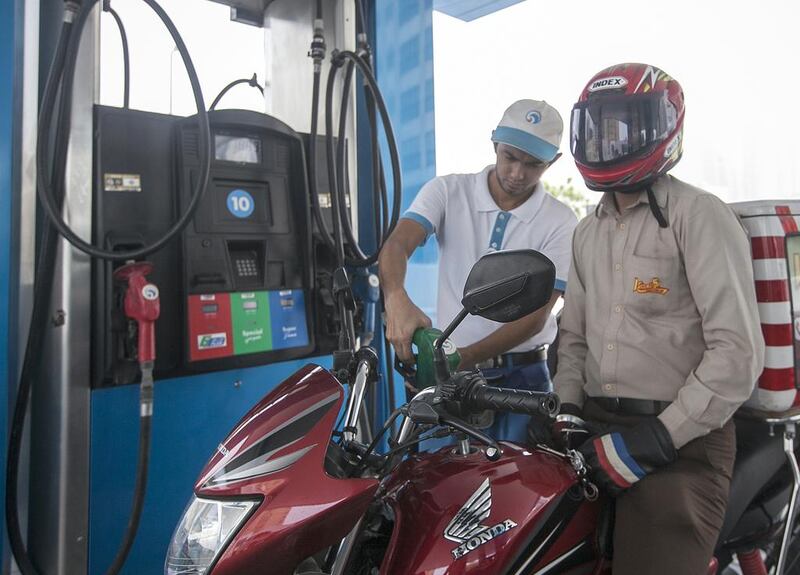DUBAI // It is now more expensive to pour milk on your morning cereal than it is to put petrol in your car.
The price of petrol at the pump has fallen for the sixth consecutive month, with a litre of special costing Dh1.47. The cost of a litre of super is now Dh1.58 and diesel Dh1.37.
The continued decrease in the price of crude means that various essential everyday items are now significantly more costly than petrol.
If you want to pour Al Rawabi fresh full cream milk on your cereal it will cost you Dh5.50 a litre from Emirates Co-op.
And those who like imported mineral water will have to pay Dh7.90 at Carrefour for a 1.5-litre bottle of Evian.
A litre of Pepsi is Dh3 at Panda supermarket, with Al Ain Fresh Fruit Juice costing Dh4.50 at Carrefour. A bottle of Dettol antiseptic disinfectant liquid is Dh29.72 from the same supermarket.
Fortunately for motorists, cars do not run on sunflower oil, otherwise the Dh7.75 a litre it costs at Choithrams could make drivers think twice before getting behind the wheel.
Even a box of six Saha Dubai eggs are more than double the price of petrol, at Dh3.90, while Golden Loaf bread is Dh4.50.
While petrol is fuel for cars, many office workers will say coffee is their fuel. In the unlikely event that they would want to drink a litre of it, the estimated price of a Starbucks cafe latte would be Dh34.
The fall in prices came as welcome news for motorists, especially those who drive big gas-guzzling 4x4s.
Yasmine Saade, who drives a Toyota Prado, is very happy with the prices at the pump this week. Usually a full tank would cost the Dubai resident about Dh135, but this week it was Dh115.
The marketing executive, however, worried about the repercussions such a large drop in petrol prices could have on the wider economy.
“While it’s always nice to save money in Dubai, it’s scary to think of the effects of low oil prices and what’s happing to the economy as a result of it. It’s a bit scary for Dubai residents.”
Dr Hassan Galadari said that while lower fuel prices were great news for car owners, he did not expect people to rush out to swap smaller, economical cars for larger vehicles any time soon.
“People are choosing much more fuel-efficient cars now because there is awareness about climate change that there wasn’t before,” he said.
The Emirati dermatologist, who drives a 5.7-litre Cadillac Escalade, has seen first hand how price fluctuations in petrol can affect his wallet.
“When they removed the subsidies, it went from about Dh180 to about Dh200 and then it’s been going down to about Dh160,” he said.
Brent crude prices have declined 10 per cent since December 28, when fuel prices in the UAE were last updated. The European benchmark fell more than 1 per cent yesterday morning in Asian trade at $32.75.
August was the only month when fuel prices increased after the Ministry of Energy said it would liberalise them.
Transport and logistics firms will also benefit as diesel prices have been cut by 14.9 per cent to Dh1.37 compared with Dh1.61 this month.
Energy Minister Suhail Al Mazrouei said he expected the global oversupply of crude to decline this year, even after Iran adds an expected 500,000 barrels per day in oil output.
“Iran’s possible production increase of 500,000 barrels per day this year won’t be enough to meet the expected demand,” Mr Al Mazrouei said. “It’s difficult to see where the new oil supply is coming from this year to fill the expected annual demand increase of at least 1.3 million barrels a day.”
nhanif@thenational.ae






